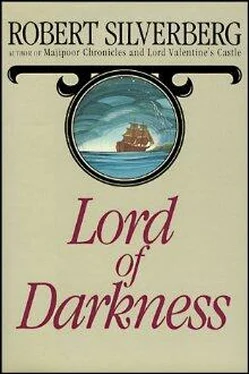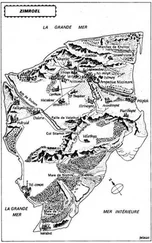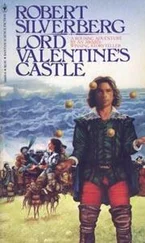Robert Silverberg - Lord of Darkness
Здесь есть возможность читать онлайн «Robert Silverberg - Lord of Darkness» весь текст электронной книги совершенно бесплатно (целиком полную версию без сокращений). В некоторых случаях можно слушать аудио, скачать через торрент в формате fb2 и присутствует краткое содержание. Год выпуска: 1983, ISBN: 1983, Издательство: Arbor House, Жанр: Исторические приключения, на английском языке. Описание произведения, (предисловие) а так же отзывы посетителей доступны на портале библиотеки ЛибКат.
- Название:Lord of Darkness
- Автор:
- Издательство:Arbor House
- Жанр:
- Год:1983
- ISBN:0-87795-443-7
- Рейтинг книги:5 / 5. Голосов: 1
-
Избранное:Добавить в избранное
- Отзывы:
-
Ваша оценка:
- 100
- 1
- 2
- 3
- 4
- 5
Lord of Darkness: краткое содержание, описание и аннотация
Предлагаем к чтению аннотацию, описание, краткое содержание или предисловие (зависит от того, что написал сам автор книги «Lord of Darkness»). Если вы не нашли необходимую информацию о книге — напишите в комментариях, мы постараемся отыскать её.
Lord of Darkness — читать онлайн бесплатно полную книгу (весь текст) целиком
Ниже представлен текст книги, разбитый по страницам. Система сохранения места последней прочитанной страницы, позволяет с удобством читать онлайн бесплатно книгу «Lord of Darkness», без необходимости каждый раз заново искать на чём Вы остановились. Поставьте закладку, и сможете в любой момент перейти на страницу, на которой закончили чтение.
Интервал:
Закладка:
After I had lived six months with the dried flesh and fish, sharing my abode with hippopotamus and coccodrillo, and seeing no end to my misery, I wrought means to get away. For though I was dwelling quietly and in peace here, with a strange tranquility of my soul that I think arose from a deep and utter weariness of adventure, yet did I hope for a change of habitance, and perhaps to resume my long-interrupted voyage home. For, like wandering Ulysses, though I might dwell this season among the Lotus-eaters and that season on the isle of Calypso, and in this place and that, yet always did I dream fondly of mine own bed and mine own hearth in the land of my birth, even if that land had become as strange to me as any place in the world.
So did I make a departure. In the lake of Kasanza are many little islands that are full of trees called bimba, which are as light as cork and as soft. Of these trees I built a jangada or raft with a knife of the savages that I had with me, in the fashion of a box nailed with wooden pegs, and railed round about, so that the sea should not wash me out; and with a blanket that I had, I made a sail, and prepared three oars to row withal.
This lake of Kasanza is eight miles over, and issueth into the River Mbengu. So I entered into my jangada and my two Negro boys with me, and rowed into the River Mbengu, and so came down with the current twelve leagues to the bar that crosses the rivermouth. Here I was in great danger, because the sea was great, and my boys, seeing the upheaval of the waves, did cry out that their last hour was come.
“Have no fear,” I told them cheeringly, “for I am Andrew Battell that comes of a great line of mariners, who are pilots of the Trinity House.”
I will confess long after the event that I, too, knew fear just then; but I could not believe that God my Provider, having sustained me so long and through so much, had it of His plan to drown me in this surf. And I carried my raft safely over the bar and rode into the sea, and then sailed afore the wind along the coast, which I knew well, minding to go to the kingdom of Loango, which is toward the north.
And why did I not go to São Paulo de Loanda? Ah, but I knew naught of what befell there, except that in all likelihood Manoel Cerveira Pereira was yet governor, and he was mine enemy. It seemed me much wiser to chance the voyage in this little raft of my devising, and be blown along the upper coast, than to put my head back into the jaws of the lion in that city. And if I spent the rest of my days in Loango, never seeing England again, well, so be it, but at the least I would cheat the Portugals of my death.
So northward aye I went, and the boys with me, all that day and the night. The next day I saw a pinnace come before the wind, which journeyed from the city of São Paulo de Loanda, and she came near to me. There was no escaping from this ship, so I stood by, waiting for her to fall upon me, and ready to sell my life at a very fine price, and it come to that. But when the Portugals drew nigh and hailed me, great was my amaze and joy, for the master of this ship was my great friend Pinto Cabral of old days, elder brother to Nicolau. Who looked at me high and low and said, “Andres? Is this Andres the Piloto, that I shipped with in years gone by, and had the saving of my life when I was drowning upon that devil-shoal?”
“The same,” said I. “Much changed without and within, and yet somewhat unaltered in essence, I do hope.”
We embraced, and he gave me wine, in which I greatly joyed, and some beef and biscuit, and fed my boys also. I asked him of the city’s news, which was very little. Cerveira Pereira was yet governor, said he. Pereira Forjaz was said to be sailing soon from Lisbon, but they had been saying that for a year. “I know not this little Cerveira Pereira well,” declared Cabral, “for I have been to the north, in São Tomé, these two years. But he is much hated, and I think will not be lamented when he goes.”
“Most especially by me,” I said, “for that he did deny me my passage home, after pledging it.”
Pinto Cabral laughed, and said, “It is ever thus with you, Andres, is it not? But your time will come, and your breeze will waft you homeward at last.”
“May God grant it, friend,” said I.
I asked him of his brother Nicolau, my partner. But here the news was grievous: for that faithful man was dead, slain by brawlers in the streets of the city. This left me downcast, both for that I had loved that man in the little time I knew him, and that I had entrusted the major part of my gold to his keeping, which surely was all vanished now. Of my treasure there remained only the pouch at my waist, in which I had prudently taken some pieces of gold when I slipped away from São Paulo de Loanda. And Pinto Cabral, in recognition of my misfortunes, did give me some other gold also.
He was bound for São Tomé to do business in slaves. But because that we had been shipmates together, he took me for pity’s sake to Loango, and set me on shore in that port, where I had gone with him in ancient days when I was the pilot of the governor’s pinnace; and there he left me.
Well did I remember this place, where I had seen the coocodrillo that ate the eight slaves, and the dead Jaqqa that so frighted everyone, and the burial-ground of the kings, and other wonders that struck me so strange when I was new in this land. Now I walked the three miles from the waterside to the town, calm as a tree, and when I saw the people of the place I saluted them and bade them good morrow in their own tongue most fluently, and entered into the city like a townsman coming home. I remembered, as if I had seen it but yesterday, the great house of the Maloango or king, and the wide street to the market, and all the rest. And at audience-time I did go to the Maloango and sit before the king, which was the same king from my past visit, much older and white of hair, and I cried “Nzambi! Ampungul” in salutation, that is, 0 Most High God.
To which he replied with that greeting once so mysterioius to me,”Byani ampembe mpolo, muneya ka zinga” that means, My companion, the white face, has risen from underground and will not live long, which was so strange a thing to hear, though it was but a ritual phrase.
“Are you come in trade?” said he then.
“Nay, I am come to take sanctuary here from the fury of the Portugals, who have barred me from my native land. And I have been here before, when my hair was golden.”
This king the Maloango Njimbe remembered me then, and spoke of the time when I had gone diving in the sea in the hope of recovering the mokisso- idol that they had dropped there. And then came forth another who remembered me, which was his white-skinned ndundu wizard of the red eyes, that had seen me long ago and at that time did send a coldness into my soul. This creature was now of great age, and withered and hideous, and came shuffling forward to inspect me.
At length he said, “You are the white Jaqqa.”
“Aye, so you called me once, and I did not understand it.”
“But now understanding has come into you?”
“That it has, and burned me deep.”
“You are a Jaqqa still,” the albino creature said, “and yet there is no danger about you. For you have made your voyage, and you have come to rest, and all is well within you. You are a Jaqqa -ndundu now.”
Now that is a hard thing to comprehend, a Jaqqa -ndundu, nor did I ask him to spell me the meanings of it. Yet so far as I can fathom, what he was saying was, I was a white man who had turned black inside, and now was white again, but my color now was the whiteness of the albino, the changeling, and not the whiteness of the white man. Well, and I do not pretend to be a penetrating scholar, but I think I have the drift of it. The one thing is certain, that on my first visit here this sorcerer had looked on me with dread and loathing, a monster to be shunned, but now he bade the Maloango make me welcome in this land, as something holy that had been cast up on their shores.
Читать дальшеИнтервал:
Закладка:
Похожие книги на «Lord of Darkness»
Представляем Вашему вниманию похожие книги на «Lord of Darkness» списком для выбора. Мы отобрали схожую по названию и смыслу литературу в надежде предоставить читателям больше вариантов отыскать новые, интересные, ещё непрочитанные произведения.
Обсуждение, отзывы о книге «Lord of Darkness» и просто собственные мнения читателей. Оставьте ваши комментарии, напишите, что Вы думаете о произведении, его смысле или главных героях. Укажите что конкретно понравилось, а что нет, и почему Вы так считаете.












